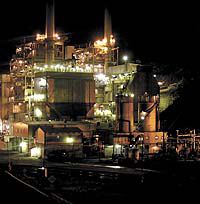| The Carbon Power Plant at night lights up Price Canyon as motorists travel by it. Coal powered power plants could be one of the victims of pending rules on air pollution and CO2 releases. |
The Utah Farm Bureau Federation at its annual convention on Nov. 15 will release a new study that shows Utahns will bear a disproportionate share of the economic costs for policy proposals related to the Western States Climate Initiative (WSCI). The WSCI has set a regional goal of reducing greenhouse gases by 15 percent from 2005 levels by 2020.
A new study commissioned by the Center for Energy and Economic Development, combines research done by the Massachusetts Institute of Technology (MIT) and Penn State University and examines the potential costs associated with market-based greenhouse cap-and-trade policies. Both concluded that participation in state or regional cap-and-trade schemes could reduce Utah’s annual economic output by billions of dollars, coupled with the loss of tens of thousands of jobs.
Randy Parker, Chief Executive Officer of the Utah Farm Bureau Federation represented agriculture and rural Utah on the Governor’s 24-member Blue Ribbon Panel on Climate Change (BRAC).
“Throughout the BRAC process, Farm Bureau called for independent economic analysis of the impacts to Utah’s economy, Utah consumers and our farmers and ranchers,” Parker said. “This is the first analysis that quantifies the costs on implementing carbon tax policies.”
Geography has dictated that Utahns have the third largest carbon footprint among the states while enjoying some of the nation’s lowest power rates. Hydro, wind, geothermal and renewables currently provide only a small piece of our power needs, while nuclear power has never been embraced by Utahns. More than 95 percent of in-state power generation comes from plants powered by Utah’s abundant coal and natural gas.
“Farm Bureau was compelled to be at the table during the BRAC process because our state’s farmers and ranchers are major energy users, especially electricity and petroleum based products,” Parker said. “Producing abundant food and fiber requires fertilizer and fuel for planting, harvesting, processing and transporting, all energy intensive processes. Any policy adopted to reduce greenhouse gases will likely increase energy costs for agriculture, while conversely, bio-fuels, renewable energy, carbon credits and carbon sequestration may provide an income opportunity for farmers and ranchers.”
“In the absence of hard economic facts through the BRAC process, this new information is critically important in balancing debate on Utah’s policy options,” Parker said. “All Utah citizens should want policy-makers to exercise caution before embracing the California model.”
The new study will be available following presentations on climate change at the Farm Bureau convention by Dianne Nielsen, Governor Jon Huntsman’s Energy Advisor and Christopher Horner, a senior fellow at the Competitive Enterprise Institute.
According to the report public policies that are being debated in Washington, D.C. and our state capital will increase the size, cost and power of government. Ultimately, there is the potential that government will drain billions of dollars a year in economic activity and private wealth to be redistributed in the name of global warming.

